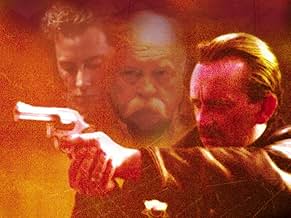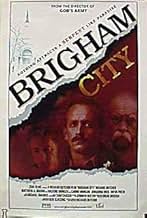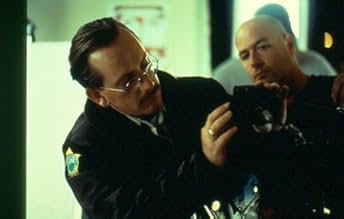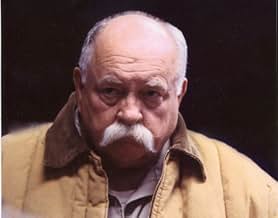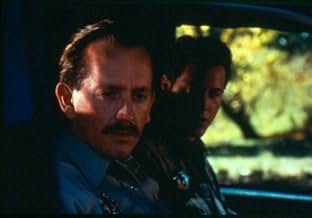VALUTAZIONE IMDb
6,6/10
1701
LA TUA VALUTAZIONE
Aggiungi una trama nella tua linguaThe sheriff of a small Utah community searches for a serial killer.The sheriff of a small Utah community searches for a serial killer.The sheriff of a small Utah community searches for a serial killer.
- Premi
- 3 vittorie totali
Wendy Hoop
- April
- (as Wendy Gardiner)
Recensioni in evidenza
I live in Mapleton, UT where it was filmed, and am LDS. I enjoyed the movie. If you don't understand the Church's dogma then the end of the movie may not mean that much to you.
I enjoyed the suspense and liked the acting. You can say what you want about the religon and the politics but it's not much different then other places in the world. If you saw the movie Chocolat, you can see the same thing there.
I enjoyed the suspense and liked the acting. You can say what you want about the religon and the politics but it's not much different then other places in the world. If you saw the movie Chocolat, you can see the same thing there.
Several days after seeing this movie, I'm still thinking about it. That's about the highest compliment I can pay to a film.
As in all great films, the power of _Brigham City_ lies beneath the surface. The whodunit plot is merely a prop for the exploration of issues that affect us all, especially those of us who claim some sort of religious faith. The age-old question of whether innocence and wisdom can coexist is asked, never answered, and in the end eclipsed by a more pertinent question: If redemption is available for those who have lost their innocence, is it also available for those who fail through lack of wisdom?
As in all great films, the power of _Brigham City_ lies beneath the surface. The whodunit plot is merely a prop for the exploration of issues that affect us all, especially those of us who claim some sort of religious faith. The age-old question of whether innocence and wisdom can coexist is asked, never answered, and in the end eclipsed by a more pertinent question: If redemption is available for those who have lost their innocence, is it also available for those who fail through lack of wisdom?
I thoroughly enjoyed this one. I watched it knowing it wasn't going to be a light-hearted film, which was an advantage over many people I know who went to it thinking it was a happy ending sort of show. I must admit it was a little odd to see the goings-on of LDS church meetings and other LDS cultural aspects on the big screen, but it is territory that needs to be covered so that future movies that cover similar territory won't be weighed down with reviews about the LDS church rather than focusing on the movie at hand. I watched the DVD a second time with Richard Dutcher's audio commentary and, after that, I concluded that he is someone who is conscientious about finding the balance in film in regards to the religious issues dealt with, not too pro or too anti. I was quite amazed as to how resourceful he was, considering their meager budget he had to work with. The outcome was superb and he told the story in a simple, yet elegant way. I look forward to Mr. Dutcher's next film.
It's difficult to watch Richard Dutcher's very capable and entertaining, `Brigham City,' without choking on the intended Mormon zeitgeist that permeates the story. Dutcher goes to considerable length to successfully portray Mormons as loving, decent, church-going friends and neighbors as justification for suspending constitutional rights and imposing a theocracy.
Dutcher plays Wes Clayton, Sheriff of a fictional small town in Utah called Brigham City. Clayton is also the `Bishop' for Mormons in that area, which makes him unquestionably the most influential man in town. A widower who lost his wife and only son in a traffic accident years ago, Clayton is permanently saddened by the loss. Dutcher portrays him with a kindly stoicism, a righteous man who takes both his sacred and secular responsibilities seriously.
When a young woman from California is found murdered in an old barn on the outskirts of town, Clayton calls in the FBI and washes his hands of the investigation, telling his enthusiastic young deputy that this has nothing to do with Brigham City, that it was a random act that could have happened on any number of freeway off ramps. It's something Clayton desperately wants to believe; that Brigham City is a paradise of the faithful and as a result enjoys a divine immunity from the evil `out there' in the world. His duty as both Sheriff and Bishop is to keep it that way. Unfortunately, a second body is discovered, and Clayton is forced to realize that his `Eden' has been invaded by the outside world, and his duty now requires him to get involved.
His ensuing investigation makes your skin crawl. Clayton's methodology is autocratic and fascist. His first suspicion is that the murderer must be an outsider or a `Jack Mormon;' consequently, he and his deputies hang out at the only bar in town, collecting beer bottles and glasses to dust for fingerprints, hoping for a match from the FBI database. When the town's convenience store clerk disappears, Clayton ratchets up the police state, using his authority as Bishop to order church members to go out two by two, as in their missionary days, and search every house in town, lack of a search warrant notwithstanding. When one of them objects by saying he has to be at work, Clayton responds that nothing is more important than the life of the missing girl. When one of the town members rightfully refuses to allow a search of her house, he forces his way in.
Despite deep faith, good intentions, and concern for another human life, fascism in the name of Jesus is still fascism. Clayton's heavy-handedness is precisely why the Bill of Rights exists. While `Brigham City' is a good movie in terms of characterization and story, it is also a very frightening parable about the dangers of religion, and remarkably parallels our nation's attitude and course of action in the aftermath of September 11th. Essentially, `Brigham City' is a microcosm of what the christian right ultimately envisions as America's future, and it's no place where I'd want to live.
Dutcher plays Wes Clayton, Sheriff of a fictional small town in Utah called Brigham City. Clayton is also the `Bishop' for Mormons in that area, which makes him unquestionably the most influential man in town. A widower who lost his wife and only son in a traffic accident years ago, Clayton is permanently saddened by the loss. Dutcher portrays him with a kindly stoicism, a righteous man who takes both his sacred and secular responsibilities seriously.
When a young woman from California is found murdered in an old barn on the outskirts of town, Clayton calls in the FBI and washes his hands of the investigation, telling his enthusiastic young deputy that this has nothing to do with Brigham City, that it was a random act that could have happened on any number of freeway off ramps. It's something Clayton desperately wants to believe; that Brigham City is a paradise of the faithful and as a result enjoys a divine immunity from the evil `out there' in the world. His duty as both Sheriff and Bishop is to keep it that way. Unfortunately, a second body is discovered, and Clayton is forced to realize that his `Eden' has been invaded by the outside world, and his duty now requires him to get involved.
His ensuing investigation makes your skin crawl. Clayton's methodology is autocratic and fascist. His first suspicion is that the murderer must be an outsider or a `Jack Mormon;' consequently, he and his deputies hang out at the only bar in town, collecting beer bottles and glasses to dust for fingerprints, hoping for a match from the FBI database. When the town's convenience store clerk disappears, Clayton ratchets up the police state, using his authority as Bishop to order church members to go out two by two, as in their missionary days, and search every house in town, lack of a search warrant notwithstanding. When one of them objects by saying he has to be at work, Clayton responds that nothing is more important than the life of the missing girl. When one of the town members rightfully refuses to allow a search of her house, he forces his way in.
Despite deep faith, good intentions, and concern for another human life, fascism in the name of Jesus is still fascism. Clayton's heavy-handedness is precisely why the Bill of Rights exists. While `Brigham City' is a good movie in terms of characterization and story, it is also a very frightening parable about the dangers of religion, and remarkably parallels our nation's attitude and course of action in the aftermath of September 11th. Essentially, `Brigham City' is a microcosm of what the christian right ultimately envisions as America's future, and it's no place where I'd want to live.
Lo sapevi?
- QuizNone of the actors or crew knew whom the real murderer was prior to the last scene being filmed. The actors and crew filming the scene had to sign a contract saying they would not reveal which one of them played the murderer, until after the movie was officially released.
- BlooperAfter Wes deputizes Stu and gives him a badge, Stu doesn't wear it for the rest of the movie.
- Colonne sonoreBanjo Boy
Written by Ryan Shupe
Performed by Ryan Shupe & the Rubberband
Copyright ©1999 Ryan Shupe (BMI)
Courtesy of Tydal Wave Records
I più visti
Accedi per valutare e creare un elenco di titoli salvati per ottenere consigli personalizzati
- How long is Brigham City?Powered by Alexa
Dettagli
Botteghino
- Budget
- 1.000.000 USD (previsto)
- Lordo Stati Uniti e Canada
- 852.206 USD
- Fine settimana di apertura Stati Uniti e Canada
- 103.629 USD
- 8 apr 2001
- Lordo in tutto il mondo
- 852.206 USD
- Tempo di esecuzione
- 1h 59min(119 min)
- Colore
- Mix di suoni
- Proporzioni
- 1.85 : 1
Contribuisci a questa pagina
Suggerisci una modifica o aggiungi i contenuti mancanti


